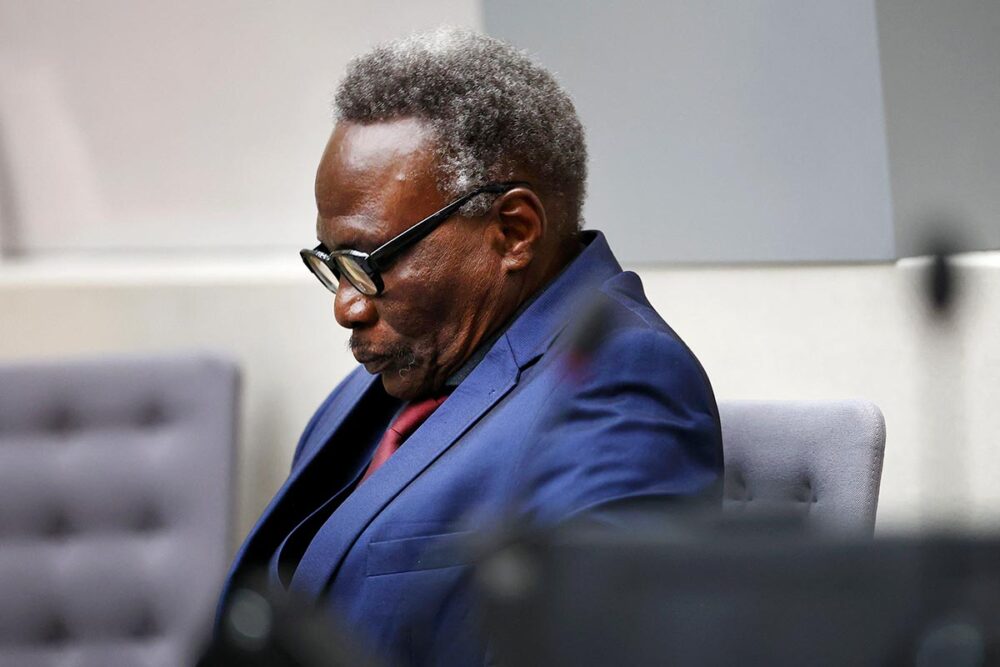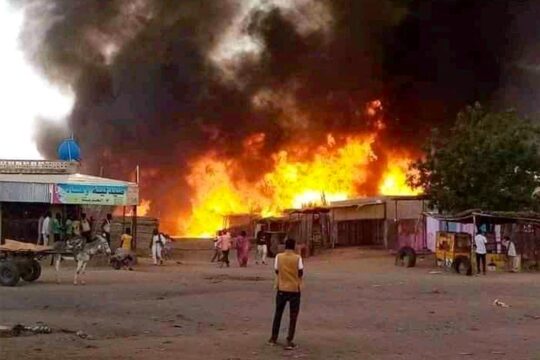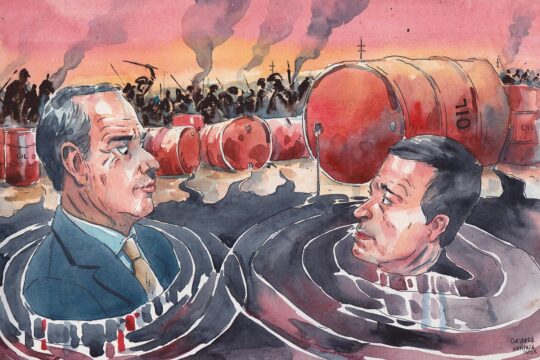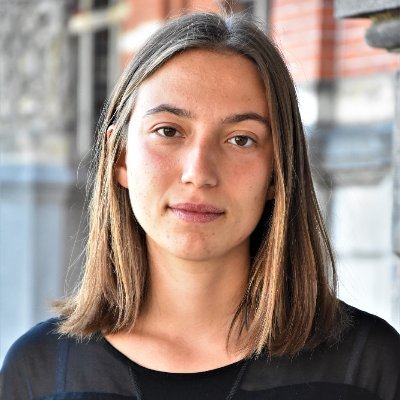This marks the first conviction in the first and only trial for crimes committed in Sudan at the Hague-based Court. On Monday, October 6, the International Criminal Court (ICC) found Janjaweed militia leader known as Ali Kushayb guilty of crimes against humanity and war crimes committed during the conflict in Darfur more than 20 years ago.
“This is the day the victims finally find some relief”, said Mohamed, speaking to Justice Info after the verdict. He was one of the around 30 members of the Sudanese and Darfuri civil society living in the Netherlands and the United Kingdom attending the hearing. Despite coming two decades later, he thinks it is “better late than never, people were looking for that and they are very pleased”.
Standing in front of a public gallery filled almost to its maximum capacity with Sudanese nationals, ICC officials, diplomats and journalists, and of defence and prosecution teams, Ali Muhammad Ali Abd-Al-Rahman listened to the judge reading his conviction. He was found unanimously guilty of numerous crimes, including rape, torture, murder and persecution on political, ethnic and gender grounds, committed between August 2003 and March 2004 in Darfur. “The accused played an active role” in the commission of the crimes, said presiding judge Joanna Korner. The judges were also “convinced beyond a reasonable doubt that the accused was the man who bore the nickname ‘Ali Kushayb’”, which the defence had strongly argued against from the start. Korner said that he had a leadership role in the Janjaweed militia and good relations with local authorities and the government of Sudan, especially with Minister of Interior Ahmad Muhammad Harun, who is subject to an ICC arrest warrant, who supplied him and the militia with weapons and money.
His sentence will be determined at a later date.
The ethnic dimension of the conflict
The conflict in Darfur erupted in 2003 when mostly non-Arabs rebelled against the Khartoum government, accusing it of marginalising them. The government mobilised, funded and armed mostly Arab militias, the Janjaweed, to counter the revolt. The government’s plan shows the “ethnic dimension” of the conflict, according to the judges, as “entire communities of the Fur, Zaghawa and Masalit [tribes] were to be targeted and attacked”, all perceived as the enemy. In 2010, the United Nations estimated that some 300,000 people had died and 2.7 million had been displaced since the start of the conflict. The U.S. and human rights groups said it amounted to genocide.
The trial started three years ago, after Ali Kushayb, now 77 years old, surrendered himself in the Central African Republic in 2020. It is the only trial in the situation in Darfur, referred to the ICC by the United Nations Security Council in March 2005. Several other arrest warrants for government top-level officials, including former Minister of Interior, former special presidential representative in Darfur Abdel Raheem Muhammad Hussein, and former president of Sudan Omar al-Bashir, have never been executed.
Since April 2023, another civil war between the Sudanese Armed Forces and the paramilitary Rapid Support Forces, which is considered to have grown out of the Janjaweed militias, has devastated Sudan and especially Darfur, with new attacks on civilians, killings and rape, and 24.6 million people plunged into hunger, according to the World Food Programme.
“This verdict sets a precedent in the case of Darfur”, comments Niemat Ahmadi, Founder and president of Darfur Women Action Group. “It sets the foundation for other cases to be brought forward; it sends a strong message to perpetrators of either the past or present crimes that one day they will be held accountable”.
The ICC alone
Far from The Hague, a few hundred Darfuri could follow the judgment. Five screenings were held in displaced persons camps with more than 300 persons, according to the ICC outreach program, which adds that one screening in Uganda saw 30 civil society representatives attending.
Ahmadi says the “ICC is the only real international mechanism that is currently actively addressing the situation in Darfur”, as there is no peace deal or any civilian protection measure. And people are hopeful it will go after other perpetrators. “Even though people are distracted by the humanitarian and civilian protection crisis on the ground”, she adds that they “followed the judgment with greater interest and eagerness”.
In a statement reacting to the verdict on October 6, Yaqoub Mohammed Abdullah of the General Coordinator of Camps for Displaced Persons and Refugees of Sudan, wrote that “this conviction is not the end of the road, but rather a first step towards achieving full justice by handing over all those wanted by the International Criminal Court”.
“Don’t leave anyone behind”
Mohamed Osman is a Researcher in Human Rights Watch’s Africa Division. He tells Justice Info that “the strength of this verdict stems from the idea that this is a man who was on the ground leading attacks, attacking civilians himself. And now two decades later, he is facing justice”.
The crimes span four main locations in West Darfur. In August 2003, the small towns of Koodom and Bindisi, which at the time counted just under 3,500 people in total, were raided, looted and burned. Ali Abd-Al-Rahman “encouraged and gave instructions that resulted in the killings, rapes and destruction committed by the Janjaweed”, said judge Korner, adding that he shouted “‘wipe out and sweep away’ or ‘God is great’, ‘don’t leave anyone behind and bring no one alive’”. “No fewer than 46 people were killed during these attacks”, she said, all civilians. Korner read some of the witness testimonies of the killings and burning of houses, as well as of the sexual violence inflicted on women and girls.
People fled from the destruction of towns towards the centres of Mukjar and Deleig. Mukjar’s population rose to 4,100 in that time, mainly Fur people, while according to the judge, Deleig was hosting more than 16,000 internally displaced persons. Men of all ages, including community leaders, were arrested at checkpoints on the roads or during house searches. They were then detained and tortured. In the cells, “the accused introduced himself as ‘Ali Kushayb’ and as the leader of the Janjaweed”, said Korner, and he physically and verbally abused the detainees. Months after, in early March 2004, several hundred detained men from both towns were loaded onto vehicles and shot dead in summary executions by the Janjaweed militia. During those, the convict “was physically present and giving orders for the execution”, said the ICC presiding judge.
All men were civilians. During the hearing, judge Korner read some of the names of those who lost their lives in the different locations.
According to Tajeldeen Ismail, General Secretary of the Fur community in the United Kingdom, who attended the hearing in the Hague, “it was important to hear what happened to people in Darfur”, and to get clarity on the sequence of events.
Waiting for new arrest warrants
“It should not be forgotten that since April 2023, another as yet unresolved and underreported armed conflict has visited yet further misery upon the innocent citizens of Sudan”, said judge Korner on Monday, at the start of the hearing.
“What we are seeing now is the cumulative impact of atrocities”, says Osman. As he visited refugee camps for Darfuri, he saw how “newer generations of survivors and victims joined the older generations of survivors and victims”. Communities live in economic hardship, he says, and the prospect of possible reparations are important.
Already in July 2023, ICC Prosecutor Karim Khan told the UN Security Council that his office had started investigating the ongoing crimes in Darfur. In January this year, Khan announced that his office had collected evidence in neighbouring countries and was particularly concerned with allegations of sexual violence. He added that the prosecution was “taking the necessary steps to put forward applications for warrants of arrest” for the new wave of crimes in West Darfur. However, until now, no arrest warrant has been publicly announced.
Ahmadi says she was expecting new warrants. “Specifically regarding Al-Genaina in West Darfur crimes and also the situation in El-Fasher. But there are a lot of delays, and the affected communities were not happy about that because we have seen how the court moves fast in other cases. People are not protected; they feel that many victims may lose their lives before they can even see a day in court with a perpetrator”.
For Osman, “it is also important to see the ICC jurisdiction be expanded to the whole country of Sudan, because these crimes are no longer confined to the Darfur region”. He explains that that would require an extension of the mandate given to the ICC by the UN Security Council – which might prove difficult in times when the US has imposed sanctions on top ICC officials and is threatening to sanction the whole institution.
“This verdict came at a time when the ICC had an existential threat, from the US sanctions in particular”, says Osman. “And this could be another wake-up call for the international community to push back on the sanctions”.








